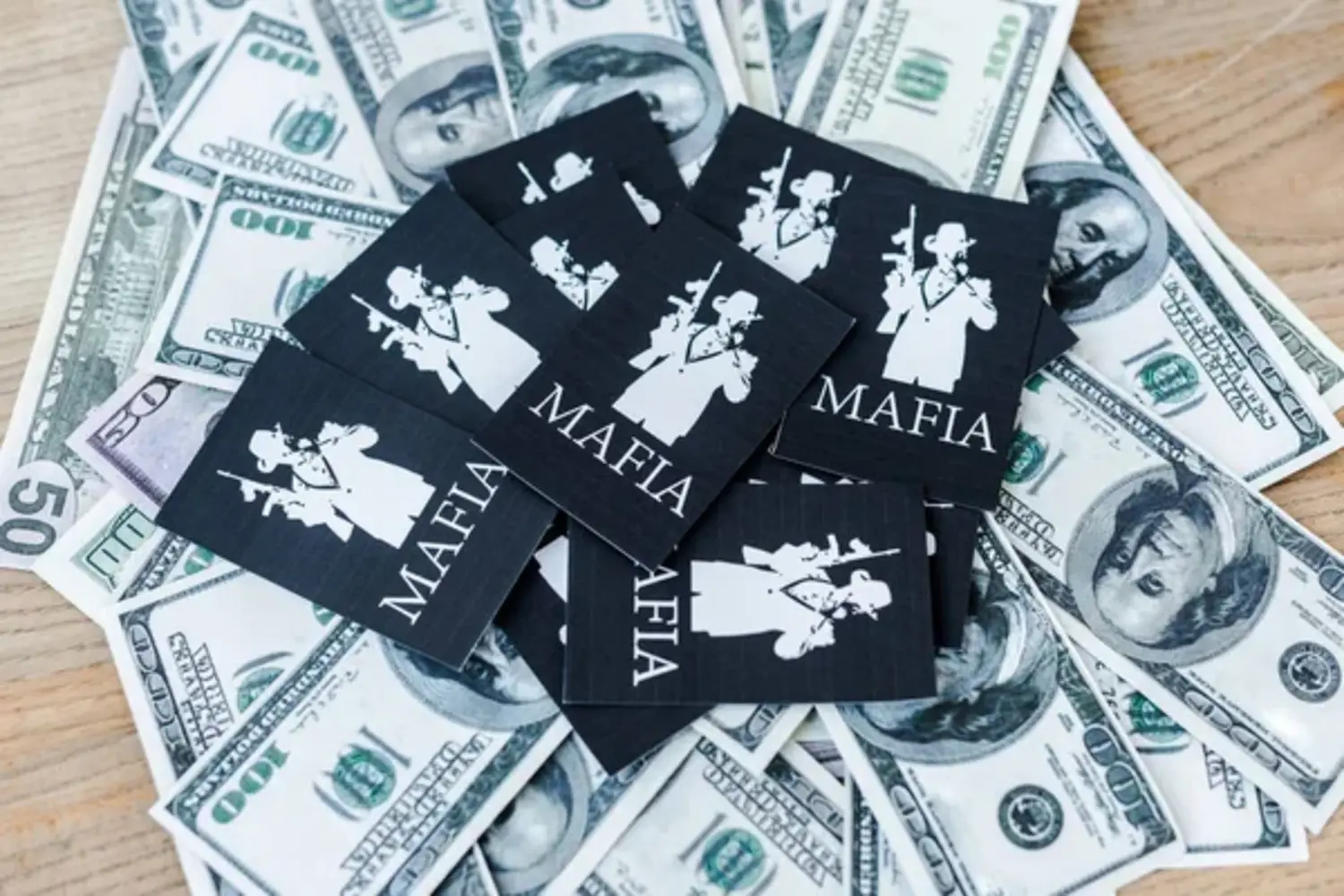Have you ever felt like there’s something off about someone you know? As if they may be involved in something sinister and mysterious? It could be possible that this person is a part of the mafia.
There are certain signs that can give away whether someone is involved with the Mafia or not. From subtly avoiding questions to having excessively large amounts of money, these are just a few of the tell-tale signs that could point to one’s involvement with the underworld.
Look out for behavior and patterns in your interactions; this will be key to determining whether a person is linked to the Mafia or not.

Signs He Is In The Mafia
There are certain signs that a person is in the mafia, ranging from their lifestyle and demeanor to the people they associate with.
These signs can be difficult to recognize if you don’t know what you’re looking for, but criminals tend to display certain behaviors that a sharp-eyed observer can spot. A person who is part of the mafia may give off an air of superior knowledge and power that most people lack.
They are often unafraid of authority, engage in activities that can cause harm or discomfort to others, and live lavishly despite having few legitimate sources of income.
Someone associated with organized crime may surround themselves with people who also operate within criminal networks. Further research into these warning signs can help individuals shed light on any suspicious activity and protect themselves.
10 Signs He Is In The Mafia
1. Refusal To Talk About Their Occupation Or Income Source.
In the world of the mafia, secrecy and maintaining a low profile are essential for their survival and operations. Refusing to talk about their occupation or income source allows mafia members to shield their criminal activities from scrutiny and avoid potential legal consequences.
One sign to look out for is when a person becomes evasive or defensive when questioned about their job or how they make money.
They may change the subject, provide vague or inconsistent answers, or become visibly uncomfortable during such discussions. This behavior can indicate an intentional effort to conceal their association with criminal activities.
The source of income for mafia members is often derived from illegal activities such as extortion, drug trafficking, loan sharking, racketeering, or smuggling.
As a result, they have a vested interest in maintaining secrecy around their financial affairs. By refusing to disclose their income source, they can avoid drawing attention to their illicit earnings and the criminal enterprises they are involved in.

2. Displaying Sudden Wealth And Living Beyond Their Apparent Means.
If an individual exhibits a lifestyle that is extravagant or significantly exceeds what would be expected based on their known income or occupation, it may suggest their involvement in illicit activities associated with organized crime.
The mafia has long been associated with generating substantial profits through illegal enterprises such as drug trafficking, extortion, gambling, and money laundering.
As a result, members of the mafia often accumulate significant wealth that allows them to live lavishly and indulge in extravagant lifestyles.
One sign to look out for is when an individual experiences a sudden and noticeable change in their financial situation.
They may acquire high-value assets, such as luxury vehicles, designer clothing, or expensive jewelry, without a clear and legitimate source of income to support such purchases. This rapid acquisition of wealth can be a strong indication of involvement in illicit activities.
Individuals in the mafia may display a conspicuous disregard for financial constraints and spend money excessively or indiscriminately.
They may frequent high-end establishments, stay at luxurious resorts, or gamble with large sums of money. Such behaviors reflect a lifestyle that is inconsistent with their apparent means, raising suspicions of mafia involvement.

3. Having Connections With Known Criminal Figures.
If an individual consistently associates or maintains relationships with individuals who have a confirmed or suspected involvement in organized crime, it may suggest their own affiliation with the mafia.
The mafia operates through a network of interconnected individuals involved in various criminal activities. These networks thrive on trust, loyalty, and shared interests. Therefore, observing a person’s associations can provide valuable insights into their own involvement in organized crime.
One sign to look out for is when an individual consistently socializes or conducts business with known criminal figures or individuals with a questionable reputation.
This may include regularly being seen in the company of individuals who have a documented history of mafia involvement, or being closely associated with those who are known to hold positions of power within organized crime networks.
The presence of a person within the inner circles of the mafia or having close ties to high-ranking members can indicate their own involvement.
It suggests a level of trust and acceptance within the criminal organization, as individuals in the mafia are typically cautious about revealing sensitive information to outsiders.
4. Using Intimidation Or Physical Force To Solve Problems Or Disputes.
If an individual consistently resorts to aggressive tactics or displays a propensity for violence when confronted with challenges, it may suggest their involvement in organized crime.
The mafia is notorious for its use of intimidation and violence as a means of maintaining control, enforcing loyalty, and resolving conflicts.
This includes employing tactics such as threats, extortion, physical assault, or even murder to exert influence and instill fear within their sphere of influence.
One sign to look out for is when an individual consistently resorts to intimidation as a means of asserting their authority or solving problems.
They may exhibit a domineering presence, use threatening language, or display a willingness to resort to physical violence to achieve their goals. This behavior indicates a reliance on fear and force as tools for achieving their objectives.
5. Being Excessively Secretive And Avoiding Contact With Law Enforcement Officials.
One sign to look out for is when an individual goes to great lengths to keep their personal information, activities, and associations hidden from others.
They may avoid discussing their whereabouts, use multiple aliases, or have an elaborate system of safeguards to protect their identity and actions.
Such behavior is indicative of a conscious effort to remain under the radar and maintain a clandestine lifestyle.
Individuals in the mafia are often wary of law enforcement officials and view them as a threat to their criminal operations. They may actively avoid any contact with the police, harbor deep mistrust toward authority figures, and take extensive precautions to stay off their radar.
This can include avoiding areas with a high police presence, utilizing counter-surveillance techniques, or having a network of informants to stay one step ahead of the law.

6. Frequently Carrying Weapons Or Firearms.
One sign to look out for is when an individual is consistently seen with weapons or firearms on their person or in their immediate vicinity.
This includes visibly carrying handguns, concealing weapons, or having ready access to firearms in their vehicles or residences. Such behavior indicates a readiness to use force and a sense of preparedness for potentially violent encounters.
Individuals in the mafia may display a deep familiarity with firearms, possess knowledge of weapon handling and maintenance, and exhibit proficiency in self-defense techniques.
They may invest significant resources in obtaining illegal firearms or acquiring permits for legal weapons to ensure their personal safety and the protection of their criminal interests.
7. Using Code Language Or Slang That Is Commonly Used By Members Of Organized Crime.
If an individual consistently communicates in a manner that includes secretive phrases, obscure references, or specialized jargon associated with the mafia, it may suggest their own affiliation with organized crime.
This may involve the use of obscure terms, euphemisms, or encrypted communication methods to convey messages related to their criminal activities.
Such behavior indicates a deliberate effort to hide their true intentions and to communicate covertly with others involved in organized crime.
Individuals in the mafia may employ specialized jargon or slang specific to their criminal enterprises, such as terms related to illegal activities, organizational hierarchies, or internal codes of conduct.
These linguistic markers serve as a way for members to identify each other and distinguish themselves from outsiders.
8 . Having Multiple Aliases Or Using Fake Identities.
If an individual consistently communicates in a manner that includes secretive phrases, obscure references, or specialized jargon associated with the mafia, it may suggest their own affiliation with organized crime.
This may involve the use of obscure terms, euphemisms, or encrypted communication methods to convey messages related to their criminal activities. Such behavior indicates a deliberate effort to hide their true intentions and to communicate covertly with others involved in organized crime.
Individuals in the mafia may employ specialized jargon or slang specific to their criminal enterprises, such as terms related to illegal activities, organizational hierarchies, or internal codes of conduct.
These linguistic markers serve as a way for members to identify each other and distinguish themselves from outsiders.

9. Having A History Of Engaging In Illegal Activities, Such As Drug Trafficking, Extortion, Or Money Laundering.
If an individual has a documented record of involvement in these illicit enterprises, it strongly suggests their affiliation with organized crime.
The mafia has long been associated with various criminal activities aimed at generating significant profits.
Members of the mafia often engage in activities such as drug trafficking, extortion, loan sharking, money laundering, and other illicit schemes to amass wealth and maintain their power within the criminal underworld.
One sign to look out for is when an individual has a history of criminal charges or convictions related to activities commonly associated with the mafia.
This may include documented involvement in drug trafficking operations, being implicated in extortion cases, or having connections to money laundering activities. Such a criminal record indicates a long-standing engagement in illegal enterprises and suggests their integration into the world of organized crime.
Individuals in the mafia often display a certain level of expertise or knowledge in their chosen criminal endeavors.
They may demonstrate an understanding of the intricacies of drug distribution networks, possess skills in money laundering techniques, or exhibit familiarity with the mechanics of extortion schemes.
These specialized skills contribute to their position within the mafia hierarchy and further confirm their involvement in organized crime.
10. Being Involved In Businesses That Are Commonly Associated With Organized Crime, Such As Gambling Or Loan Sharking.
Signs that a person is involved with the Mafia may include being a part of businesses that are typically associated with organized crime, such as loan sharking and illegal gambling.
For example, if someone is seen conducting business in back alley establishments or participating in illegal transactions, this would be a clear indication of involvement with the Mafia.
Other signs include carrying large amounts of cash on their person and having access to firearms and other weapons.
Someone who is in the Mafia might also have connections to high-ranking members of criminal organizations, as well as people who work in law enforcement or politics.
They might also carry themselves with an air of confidence, displaying an attitude of superiority over those around them.
Finally, they might have unexplained wealth or a source of income that could not be accounted for through legitimate means.
Q: Can Someone Be In The Mafia Without Fitting The Stereotypical Image?
A: Yes, the image of a mafia member portrayed in popular culture is often a stereotype. In reality, individuals involved in organized crime can come from diverse backgrounds and may not always fit the traditional mold.
It’s important to consider various factors and behaviors rather than relying solely on appearances.
Q: Are There Specific Professions Or Industries Commonly Associated With The Mafia?
A: Historically, the mafia has had a presence in industries such as gambling, construction, waste management, labor unions, and illicit drug trade. However, it is crucial to remember that the mafia’s influence can extend into other areas as well.
Q: Can Someone Leave The Mafia Once They Are Involved?
A: Leaving the mafia can be extremely challenging and often comes with significant risks. The mafia is known for its strict code of loyalty, and individuals who attempt to sever ties can face severe consequences, including threats to their personal safety or that of their loved ones.
Q: Are There Any Telltale Signs Of Mafia Involvement That Are Unique To Certain Cultures Or Regions?
A: The mafia, or similar organized crime groups, can exist in various cultures and regions under different names and structures.
While there may be cultural nuances and specific indicators associated with particular groups, the underlying patterns of criminal behavior and secrecy generally remain consistent.
Q: Can Innocent People Be Mistaken For Being In The Mafia?
A: Yes, it is possible for innocent individuals to be mistakenly associated with the mafia due to factors such as their appearance, associations, or even personal circumstances. It is crucial to exercise caution and rely on concrete evidence before making any assumptions or accusations.
Q: How Can Law Enforcement Agencies Determine If Someone Is Involved In The Mafia?
A: Law enforcement agencies rely on a combination of investigative techniques, surveillance, intelligence gathering, and cooperation from informants to build a case against individuals involved in organized crime.
It often requires significant resources, time, and collaboration between agencies to gather sufficient evidence.
Q: Are There Any Warning Signs That Individuals Should Be Aware Of To Protect Themselves From The Mafia?
A: While it’s difficult to predict mafia-related threats, individuals can take precautions to safeguard themselves by avoiding involvement in illegal activities, maintaining a distance from individuals with known criminal connections, reporting any suspicious behavior to the authorities, and prioritizing personal safety.
Q: Are There Any Support Systems Available For Individuals Trying To Escape Or Avoid Involvement With The Mafia?
A: There are organizations, both governmental and non-governmental, that provide support and resources for individuals seeking to escape or avoid mafia involvement.
Witness protection programs and law enforcement agencies dedicated to combating organized crime can offer assistance and guidance in such situations.
Q: Can A Person Be Forced Into The Mafia Against Their Will?
A: While it’s possible for individuals to be coerced or manipulated into participating in mafia activities, it is not uncommon for individuals to enter voluntarily.
Factors such as financial incentives, a desire for power or protection, or family ties can influence one’s decision to become involved.
Q: Are There Any Signs Of Mafia Involvement That Could Be Visible In A Person’S Financial Transactions Or Assets?
A: Financial transactions and assets can provide valuable insights into potential mafia involvement. Signs may include unexplained wealth, frequent large cash transactions, money laundering activities, ownership of businesses in high-risk industries, or involvement in illegal gambling or loan sharking operations.
Conclusion
In conclusion, identifying signs that someone may be involved in the mafia is a complex and nuanced endeavor. While no single sign can definitively confirm mafia affiliation, a combination of indicators can paint a more comprehensive picture.
Identifying someone’s affiliation with the mafia requires a deep understanding of the criminal underworld, its operations, and the intricacies of organized crime networks.
It is a task best left to law enforcement agencies who possess the expertise, resources, and legal framework necessary to tackle such complex investigations.

Hi, I’m Jasmine Sophie and welcome to my website!
As a marriage counsellor, I’m passionate about helping people figure out solutions to their relationship issues. While based in Austin and with most of my clients coming from the local area, I believed that there were more people out there who could benefit from my services.
That’s why I decided to set up this webiste; so that I can help even more people break through any difficulties they may be facing in their relationships. In my free time, I enjoy activities like golfing and fishing, as well as just spending time with family. It’s just another way for me to explore my creativity and use it towards helping others.
Experience:
With a wealth of experience in the realm of love and relationships, Jasmine has been transforming lives for over a decade. Her remarkable journey as a licensed psychologist and marriage and couples therapist has allowed her to witness the transformative power of love firsthand. Through her extensive work with diverse couples, she has unraveled the secrets to fostering healthy and thriving partnerships.
Expertise:
Jasmine’s expertise lies in untangling the complex web of relationship dynamics. Whether it’s reigniting the spark in long-term marriages, healing wounds from past relationships, or guiding individuals in their pursuit of true love, Jasmine possesses an unwavering commitment to helping people create fulfilling and joyful connections. Her profound insights and practical strategies have earned her accolades as a trusted authority in the love and relationship sphere.
Education:
Jasmine Sophie’s academic achievements serve as a solid foundation for her exceptional knowledge in the field. She holds a master’s degree in Psychology, specializing in marriage and family therapy. Combining her academic prowess with her empathetic nature, Jasmine seamlessly integrates evidence-based techniques and profound wisdom to empower her readers to navigate the complexities of modern relationships with grace and authenticity.
Join Jasmine Sophie on joypassiondesire.com, and embark on a transformative journey to embrace love, ignite passion, and cultivate relationships that transcend ordinary boundaries. Through her illuminating articles and expert guidance, she will empower you to create a love story that is worthy of celebration and admiration. Get ready to embark on an extraordinary adventure of love and self-discovery with Jasmine Sophie as your trusted guide.